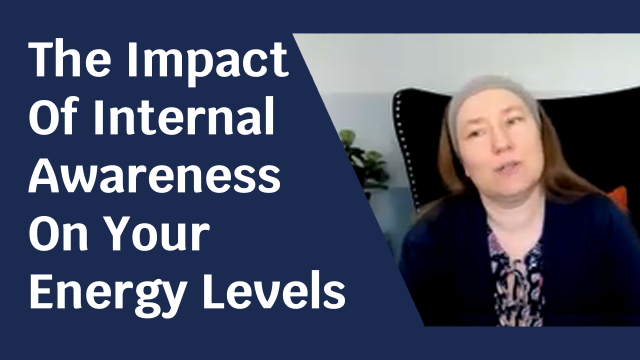
This is an excerpt from my workshop, Autistic Energy Management.
What does internal awareness do?
A large percentage of my clients and, the questions that I get around energy and other questions that were submitted before this workshop in the signup, are basically people saying that “I don’t know how to tell how much energy I have. I don’t have a connection to my body. I overdo it and I pay for it later.” Variations on that. And I get it I was there. I was there for most of my life.
The situation is that either people don’t have internal awareness. It’s numbed, it’s ignored, it’s disconnected in a variety of ways. Or they have so much awareness of it, but it’s not useful awareness. They’re hypersensitive to all sorts of feelings in their body, but it’s not making meaningful connections to something that’s useful as an information source.
What I believe you need to do is to establish useful, reliable feedback to what’s going on inside your body in real time. So that you can tell how much energy you have and what you need so that you can give your body the nutrients that it needs, the rest that it needs, the awareness of what’s going on. And, be able to use that it. Which is also, by the way, is useful for making decisions in your life, for being able to tell when people are not safe people. You get awareness of what are the red flags in a situation or with a person. It has lots of other useful side effects, but here we’re talking about energy. It’s the way you get energy.
So, why body stuff?
If physical sensations and emotions seem non-relevant to you, like they did to me for most of my life, why should you bother with this? Here’s the idea.
If any system, or machine, or group, or person can tell you exactly what it needs to be able to operate efficiently, that’s relevant info. If your computer tells you that it’s low on battery or needs a system update, you plug it in or you update the thing. If your car gives you a warning light saying the tire pressure is low, or you need to change the oil, or there’s an issue in the engine. It’s nicer to find that out when it’s at the point of warning lights, not the point of your car stopping and it won’t go anymore.
Your body gives those kinds of warning lights too, in the forms of dehydration or hunger, thirst (thirst before dehydration, ideally), the feeling of needing to go to the bathroom, of being overtired, being able to tell the difference between being tired and sleepy. There’s a whole range of physical responses that you can get useful information out of.
There’s a whole range of physical responses that you can get useful information out of.
As you do, you can gather data points about how things are affecting you in real time. Like, “This person is saying things that I’m noticing a physical reaction to, maybe that’s useful information about if this person is an okay person or not okay person to be around.” Or maybe, “I want to speak up about a topic.”
Or, “I’m noticing that I’m resisting doing a particular task.” If you notice that, you can start questioning, get into the curiosity mode of, “What is it about this task that I’m having an issue with?”
It’s generally not the whole thing. There’s usually one or two specific things. If you can figure that out, then you can use that information to solve those particular issues and then all of a sudden, the whole problem is like, “Oh, okay, I can do that now that I’ve got this one or two things taken care of.” It’s just not a big deal anymore. That’s where a lot of procrastination comes from, by the way, there’s something in there that’s bothering you and you’re not able to respond. If you can figure out what that thing is, then the procrastination goes away.
Okay, so the basic idea of long term stuff is reintegrating your physical experiences. It’s not easy and it’s not quick, it took me years and was sometimes deeply uncomfortable, but it made life so much easier afterwards. It’s so much better.




